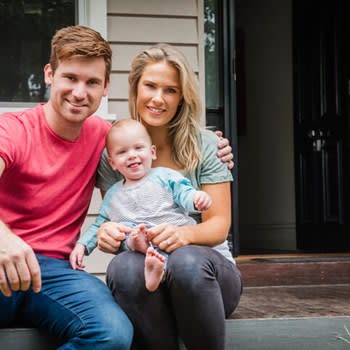Virginia Section 8: How to Qualify and Get a Voucher
- Discover how to sign up for Virginia Section 8 and receive a voucher to help with housing costs. Learn the income limits and other requirements to qualify.
If you are dealing with a financial hardship that is making it difficult to pay rent, there are several housing assistance programs available in Virginia. The most popular of these is the Virginia Section 8 program. It provides you with a housing voucher you can use to pay rent on any property in Virginia that accepts Section 8.
Because the program is so popular and vouchers are limited, wait times can be long. It's critical to fill out your application completely and correctly to avoid unnecessary delays. Here's what you need to know about the program.
Have Medicare questions?
Talk to a licensed agent today to find a plan that fits your needs.
What Is the Virginia Section 8 Program?
The Virginia Section 8 program is a government housing assistance program for low-income families. If you meet the program's income requirements and qualify for assistance, the program provides you with a voucher that you can use to pay for housing.
The Virginia Section 8 program is now called the Virginia Housing Choice Voucher program. Section 8 is not government or "project" housing. Recipients live in private houses and apartments, and their neighbors are often a mix of Section 8 and non-Section 8 residents.
The government doesn't provide the housing; it provides the means to pay for housing of your choice. Once you receive your voucher, you can use it to rent a place with any landlord or community that has an opening and accepts Section 8.
Landlords and rental communities have the option of signing up for the Section 8 program and accepting vouchers from tenants. Many choose to do this because it increases the number of prospective renters for their property. Depending on the number of properties a landlord owns, they might be required by law to accept Section 8.
Who Qualifies for Section 8 in Virginia?
To qualify for Virginia Section 8, you have to meet the program's income requirements and satisfy certain non-financial criteria.
Income Qualifications
Virginia uses the definition of "low income" set by the U.S. Department of Housing and Urban Development (HUD) to determine Section 8 eligibility requirements. HUD defines three tiers of financial hardship:
- Low income. Individuals and families who are low income earn less than 80% of the median income for the area.
- Very low income. Individuals and families who are very low income earn less than 50% of the median income for the area.
- Extremely low income. Individuals and families who are extremely low income earn less than 30% of the median income for the area.
You can qualify for Section 8 in Virginia if your annual household income places you in any of these three tiers. The lower the income tier you're in, the more assistance you're eligible to receive.
Because median household incomes vary wildly throughout Virginia, the maximum income to qualify for Section 8 in one area might not be the same as in another area.
This table shows the maximum income that qualified for Virginia Section 8 in 2023 different parts of the state based on your household size:
Maximum Income to Qualify for Virginia Section 8 in 2023
|
Metro area |
Single person |
Two-person household |
Four-person household |
|
Blacksburg |
$51,100 |
$58,400 |
$73,000 |
|
Bristol |
$39,500 |
$45,150 |
$56,400 |
|
Charlottesville |
$62,200 |
$71,050 |
$88,800 |
|
Harrisonburg |
$45,400 |
$51,850 |
$64,800 |
|
Lynchburg |
$46,500 |
$53,150 |
$66,400 |
|
Richmond |
$59,750 |
$68,250 |
$85,300 |
|
Roanoke |
$51,200 |
$58,500 |
$73,100 |
|
Virginia Beach |
$55,450 |
$63,400 |
$79,200 |
|
Washington, D.C. Suburbs |
$66,750 |
$76,250 |
$95,300 |
Other Qualifications
Virginia looks at other things besides your household income to determine if you qualify for Section 8 housing. The non-financial requirements for a voucher include the following:
- You must be a U.S. citizen or legal alien.
- You must undergo a criminal background check. Felonies and crimes involving violence or sexual misconduct are often disqualifying.
- You must be current on child support payments.
There is also a priority system for determining who gets off the waiting list first. It isn't solely based on when you applied. The greater your determined financial need, the higher of a priority you are. In addition, you can receive priority status if you fall into certain categories. These include:
- Pregnant
- Disabled
- Parent of young child
- Elderly
- Homeless
Have Medicare questions?
Talk to a licensed agent today to find a plan that fits your needs.
How Do I Apply for Virginia Section 8 Housing?
The easiest way to begin the process of collecting Section 8 benefits in Virginia is to apply online. If you lack internet access or need assistance, you can contact your local HUD representative, which you can find by calling the interactive voice system at (800) 569-4287.
For your application to be complete and accurate, you'll need the following:
- Employment and income documents for each member of your household
- Rental history for each member of your household, including any past evictions
- Proof of current residence
- Personally identifying documents such as a driver's license, passport or Social Security card
- Proof of U.S. citizenship or legal status
- Proof of disability (if applicable)
- Bank statements and financial records for each member of your household
What Are My Options if I Don't Get Approved for Section 8?
If you don't get approved for Virginia Section 8, you still have a couple of ways to receive discounted housing or rental assistance. One is to look for an income-restricted or tax-credit community. These communities offer rents that are lower than market rates and receive a tax credit from the government to cover the difference.
To get approved at one of these communities, you must make under a certain level of income. A tax-credit community's income requirements might be different from those of the Virginia Section 8 program. So, even if you don't qualify for Section 8, you might qualify for discounted rent at a specific community.
Another option is to look for private charities that provide housing assistance to Virginia residents. Great Nonprofits has a list of organizations across the state that can help with housing.
What Is the Section 8 Waiting List?
Getting approved for Section 8 in Virginia doesn't mean you'll get a voucher right away. Rather, it means you're eligible to receive one when it becomes available. That process might take days — or it might take weeks or months. It depends on the availability of vouchers at the time you get approved.
If no vouchers are available when you get approved for the program, you'll be placed on the Section 8 waiting list. During the time you're on the waiting list, you'll need to make other arrangements for housing, as you won't receive assistance from Section 8. When you get off the waiting list, HUD will notify you and provide instructions on how to claim your voucher.
Do Landlords in Virginia Have to Accept Section 8?
In Virginia, the decision of whether to accept Section 8 vouchers as a landlord might not be up to you. If you own more than four rental units in Virginia, you cannot refuse to rent to a tenant based on voucher status, according to the Virginia Fair Housing Law passed in 2020.

Learn More About Medicare
Join our email series to receive your free Medicare guide and the latest information about Medicare.
By clicking "Sign me up!" you are agreeing to receive emails from HelpAdvisor.com
Thanks for signing up!
Your free Medicare guide is on the way.
Make sure to check your spam folder if you don't see it.





